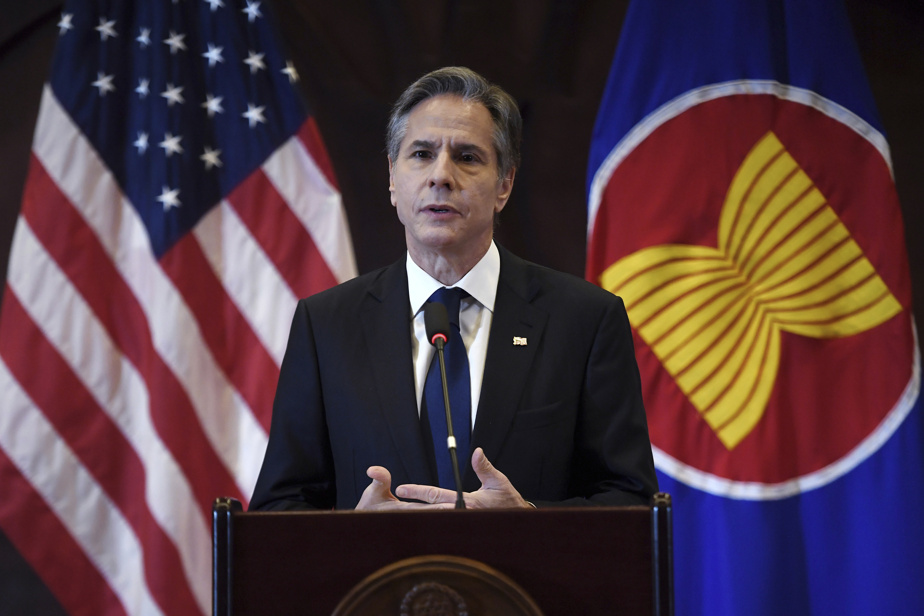(Jakarta) US Secretary of State Anthony Blinken on Tuesday called on China in Jakarta to stop its “aggressive actions” in the Indo-Pacific, hoping to refocus on this region at the heart of Joe’s foreign policy. Through many other crises.
“We are determined to ensure freedom of navigation in the South China Sea, where Beijing’s aggressive actions threaten more than $3 trillion worth of trade every year,” he said in a speech on the tree-lined campus of the University of Indonesia.
During his first tour of Southeast Asia, which will take him to Malaysia and Thailand, he reiterated Washington’s commitment to “peace and stability in the Taiwan Strait”, more than ever. Overturn the intense tensions between the two largest economies in the world.
Insisting his desire to strengthen alliances with the countries of the region, the foreign minister emphasized “to protect the right of all countries to choose their own path without any pressure or intimidation.”
“This is not a competition between an American-centric or China-centric region,” he said, before directly criticizing the Chinese position.
“There is a lot of concern, from Northeast Asia to Southeast Asia, from the Mekong River to the Pacific islands, about Beijing’s aggressive actions,” he said.
He accused China of “claiming that the open seas are its territory”, of “distorting open markets through subsidies to state-owned enterprises”, or even of “rejecting exports or canceling agreements with countries that oppose its policies”.
Countries in the region want to change this behavior. We too,” he insisted.
He believes that the US deterrence policy aims to “prevent US-Chinese competition” from descending into conflict “because it would be “disastrous for everyone”.
“the biggest challenge”
The region is experiencing rising tensions in the South China Sea with Beijing claiming nearly all of this major trading area, which is also claimed by Brunei, Malaysia, the Philippines, Taiwan and Vietnam.
Coincidence of the calendar or a manifestation of the fierce competition between the great powers in this region? Anthony Blinken’s visit to Jakarta coincides with that of influential Russian Security Council Chairman Nikolai Patrushev.
“Both the United States and Russia are good partners for Indonesia,” Indonesian Foreign Minister Retno Marsudi said on Monday.
So Moscow remembers the United States as far as Southeast Asia, where the US Secretary of State hoped to focus on his first priority: confrontation with China.
Anthony Blinken has painted Beijing’s growing ambition on the world stage as “the greatest geopolitical challenge of the twenty-first century” and seeks to strike the right balance between competition and confrontation.
But since the summer, the Afghan crisis, the deadlock in the Iranian nuclear negotiations, and most recently, tensions with Russia over Ukraine, have continued to monopolize President Biden.
The Democratic president’s strategy is not fundamentally different from that of former Republican President Donald Trump: it is a matter of insisting that the Indo-Pacific remain “free and open” and free from Chinese “intimidation”.
As Anthony Blinken reiterated on Tuesday, Biden’s team is trying to focus more on the strength of its alliances – not without some hiccups as the nuclear submarines that promised Australia’s cause have shown, infuriating France for losing a huge contract with Canberra.
Le secrétaire d’État a aussi insisté sur la nécessité de garantir un “internet fiable” et “sûr” face aux régimes autoritaires qui veulent en restreindre ou contrôler l’accès, et sur la volontérité de la “Washington de la favor” Area.
“We will work with countries in the region to provide high-quality infrastructure,” he promised, in another veiled criticism of Chinese projects that are unfavorable to local labor and the environment, but harmful to the indebtedness of the countries that benefit from them. .

“Extreme twitteraholic. Passionate travel nerd. Hardcore zombie trailblazer. Web fanatic. Evil bacon geek.”


